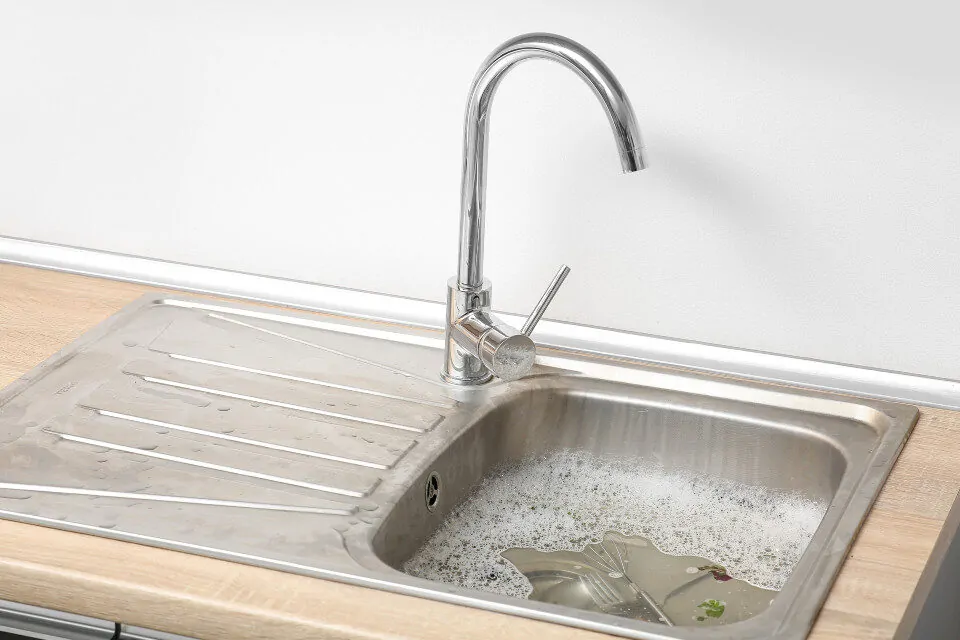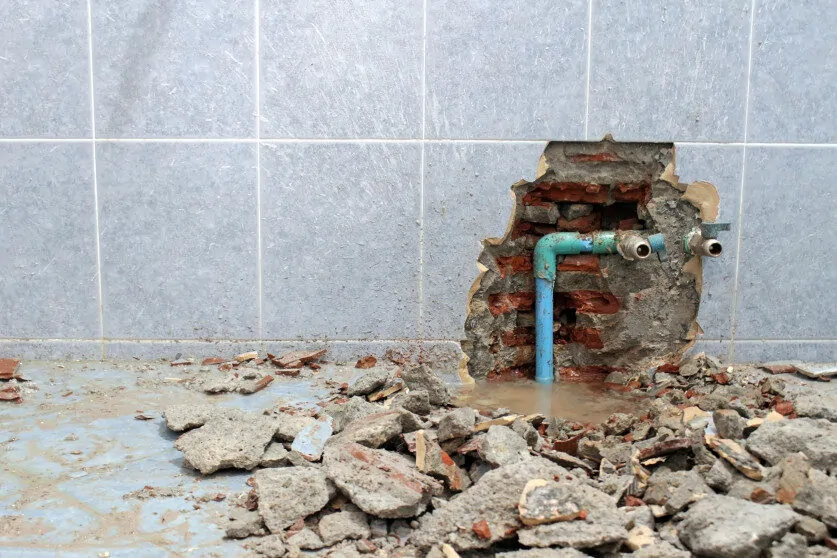Table of Contents
Common Plumbing Problems in Arizona Homes
Arizona’s desert climate and water conditions create a perfect storm of plumbing challenges that homeowners must face, unlike other parts of the United States, where plumbing problems often stem from heavy rainfall or freezing winters, hard water, extreme heat, seasonal monsoons, and occasional freezes in higher elevations, which largely cause Arizona’s plumbing issues.
This guide covers the most common plumbing problems in Arizona homes, explains the causes of each issue, and offers practical solutions, ranging from simple DIY fixes to knowing when to call a professional. Whether you live in Phoenix, Tucson, or Scottsdale, the advice helps you protect your home, conserve water, and prevent costly plumbing emergencies.
Causes and Solutions to Common Plumbing Problems
1. Hard Water Problems
Cause
Arizona’s groundwater is naturally high in calcium and magnesium. When this hard water flows through your plumbing system, it leaves behind mineral deposits known as limescale. Over time, these deposits clog pipes, damage fixtures, and shorten the lifespan of water-using appliances.
Common signs of hard water include:
- White, chalky buildup on faucets and showerheads.
- Stubborn spots on dishes and glassware.
- Soap that doesn’t lather properly, leaving skin and hair dry.
- Appliances (like dishwashers and washing machines) need more frequent repairs.
In Phoenix alone, water hardness often exceeds 300 ppm, exposing pipes and appliances to scaling minerals.
Solutions
- Install a water softener: This is the most effective long-term solution. A softener removes calcium and magnesium, preventing scale buildup. Many Arizona homeowners consider this a necessity, not a luxury.
- Point-of-use filters: Reverse osmosis systems under sinks ensure clean drinking water without the “salty” taste some softeners leave.
- Routine cleaning: Soak showerheads and faucet aerators in vinegar monthly to dissolve deposits.
- Appliance care: Regularly descale dishwashers, coffee makers, and water heaters.
2. Pipe Leaks and Corrosion
Cause
Arizona homes built with copper pipes often develop pinhole leaks. These leaks are usually the result of mineral-rich water corroding the inside of copper pipes over time. High water pressure and poor installation can make the problem worse.
Leaky pipes’ first signs may be:
- Damp spots on drywall or ceilings.
- A sudden spike in your water bill.
- Mold or mildew odors in the home.
Solutions
- Regular inspections: You should have a plumber inspect your pipes every year, especially if your home was built before 2000.
- Pipe replacement: Upgrade to PEX piping, which is resistant to corrosion and better suited for Arizona’s hard water.
- Leak detection systems: Smart home devices can alert you when unusual water flow is detected, preventing major damage.
- Water treatment: Reducing mineral content through softeners helps slow corrosion in existing copper pipes.
3. Low Water Pressure
Cause
Low water pressure is a frustrating but common issue in Arizona homes. Causes include:
- Mineral deposits are narrowing pipes and fixtures.
- Leaks within the plumbing system.
- Supply fluctuations.
- A failing or improperly adjusted pressure regulator.
Solutions
- Clean aerators: Remove faucet aerators and showerheads, then soak them in vinegar to remove mineral buildup.
- Flush pipes: Sediment inside water lines and heaters can be flushed out to restore flow.
- Check for leaks: If the water pressure suddenly drops, it may indicate a hidden leak.
- Adjust or replace pressure regulators: A plumber can ensure your home maintains optimal pressure levels.
4. Clogged Drains and Sewer Line Issues
Cause
Like everywhere, Arizona homeowners deal with clogs caused by grease, food scraps, and hair. However, in Arizona, tree roots pose an additional challenge. In dry soil, roots seek out sewer lines as a water source. Older neighborhoods with clay or cast iron pipes are especially prone to root intrusion.
Warning signs include:
- Slow drains throughout the home.
- Gurgling sounds in toilets.
- Foul odors from sinks or drains.
Solutions
- Preventive habits: Never pour grease down the drain, and use strainers to catch hair and debris.
- Enzyme cleaners: Monthly treatments with enzyme-based cleaners help break down buildup.
- Camera inspections: For persistent issues, plumbers use cameras to inspect sewer lines for damage or root intrusion.
- Trenchless sewer repair: This modern technique allows plumbers to reline pipes without digging up your yard.

5. Water Heater Problems
Cause
Hard water causes sediment buildup at the bottom of water heater tanks, reducing efficiency, increasing energy bills, and causing strange noises like popping or rumbling. In severe cases, sediment causes overheating and tank failure.
Solutions
- Annual flushing: Drain and flush your water heater to remove sediment.
- Replace the anode rod: The sacrificial rod prevents tank corrosion and requires replacement every few years.
- Tankless water heaters: These units heat water on demand, making them less prone to sediment buildup.
- Set the temperature to 120°F: This helps minimize mineral scaling and reduces energy use.
6. Toilet Issues
Cause
The most common toilet problems in Arizona are:
- Constant running caused by worn flappers or faulty fill valves.
- Leaks at the base due to deteriorated wax rings.
- Low-flow models or improper flushing habits cause frequent clogs.
Solutions
- Replace flappers, valves, or handles—all inexpensive fixes.
- Reseal with a new wax ring if water pools at the base.
- Upgrade to modern EPA Water Sense toilets for efficiency and better performance.
7. Faucet and Fixture Leaks
Cause
Hard water damages washers, O-rings, and cartridges inside faucets and showerheads. Outdoor spigots, exposed to Arizona’s temperature extremes, are also prone to leaks.
Solutions
- Replace worn washers and cartridges promptly.
- Choose fixtures designed for hard water that resist scaling.
- Inspect outdoor spigots seasonally to catch leaks early.
8. Outdoor Plumbing Challenges
Cause
Arizona landscaping often relies on irrigation systems, which face unique stresses:
- Extreme summer heat can crack pipes and damage sprinkler heads.
- Occasional freezes in northern Arizona burst unprotected outdoor plumbing.
- Pool systems require constant maintenance due to heavy use.
Solutions
- Perform seasonal inspections of irrigation lines and sprinkler heads.
- Insulate outdoor pipes in cold regions, such as Flagstaff or Prescott.
- Maintain pool pumps and filters with regular servicing.
9. Seasonal and Climate-Specific Issues
Cause
Arizona’s climate introduces unique plumbing stresses:
- Monsoon rains overwhelm drainage systems.
- Extreme summer heat weakens outdoor plumbing materials.
- Freezing winters in northern Arizona cause pipes to burst.
Solutions
- Pre-monsoon prep: Clear gutters and storm drains before summer.
- Summer checks: Inspect irrigation systems regularly for heat damage.
- Winterize in cold zones: Disconnect hoses and insulate pipes in areas like Prescott and Flagstaff.
10. Preventive Maintenance
Cause
Most plumbing disasters happen because of neglect. Without inspections, small leaks turn into floods, and minor clogs become sewer backups.
Solutions
- Schedule annual plumbing inspections.
- Maintain water softeners and filters.
- Flush water heaters yearly.
- Install smart water monitoring devices.
- Conserve water by fixing leaks promptly and installing efficient fixtures.
FAQs
1. Why is Arizona’s water so hard?
Most of Arizona’s water comes from underground aquifers rich in calcium and magnesium, which create hard water.
2. How much water does a leaking faucet waste?
Even a slow drip can waste over 3,000 gallons per year, raising water bills and straining resources.
3. How often should Arizona homeowners flush their water heater?
At least once a year, more often in areas with extremely hard water, such as Phoenix and Scottsdale.
4. Are tree roots really a problem in Arizona sewer lines?
Yes. Roots in dry soil grow toward sewer lines for moisture, often invading older clay pipes.
5. Should I winterize pipes in Arizona?
If you live in Flagstaff, Prescott, or northern Arizona, yes. In Phoenix and Tucson, it’s rarely necessary.
6. What’s the average lifespan of a water heater in Arizona?
Because of hard water, most water heaters last 8–10 years, compared to 12–15 years elsewhere.
7. What’s the best type of pipe for Arizona homes?
Experts highly recommend PEX piping. It’s flexible, resistant to scale, and performs well in Arizona’s climate.
8. Can low water pressure mean a hidden leak?
Yes. A sudden drop in pressure often indicates a leak somewhere in your plumbing system.
9. How much does it cost to fix a pipe leak in Arizona?
Minor leaks can cost $150–$400, but major leaks hidden in walls can cost thousands if not caught early.
10. Do all Arizona homeowners need water softeners?
Not legally, but in most cities, it’s highly recommended to protect plumbing, appliances, and fixtures.
Final Tips
Even though Arizona homes face unique plumbing challenges, consistent maintenance manages or avoids most problems. Here are some final tips to keep your plumbing system healthy year-round:
- Tackle hard water early: Installing a water softener is one of the smartest investments an Arizona homeowner can make. It prevents buildup, protects appliances, and reduces the risk of corrosion.
- Schedule annual inspections: A licensed plumber can spot hidden leaks, corroded pipes, or early signs of sewer issues before they become major repairs.
- Flush and clean regularly: Water heaters, drains, and irrigation lines should be flushed at least once a year to remove sediment and debris.
- Prepare for the seasons:
- Before monsoon season, clean out gutters, storm drains, and yard drainage systems.
- During summer, check outdoor plumbing often for cracks from heat exposure.
- In northern Arizona, during winter, insulate exposed pipes and disconnect hoses to prevent freezing damage.
- Upgrade old plumbing: If your home still has aging copper pipes or inefficient fixtures, consider switching to PEX piping and WaterSense-rated toilets and faucets.
- Watch your water bill: Unexplained spikes are often the first sign of a hidden leak. Address them quickly before they escalate.
- Use smart tech: Modern leak detectors and water monitoring systems can alert you to problems instantly, saving water and preventing costly damage.
By staying proactive with these preventive steps, Arizona homeowners can protect their plumbing systems, conserve water, and extend the lifespan of their fixtures and appliances—all while saving money in the long run.
Conclusion
Common plumbing problems in Arizona are unavoidable—but they don’t have to become expensive disasters. By understanding the causes and applying the right solutions, you can protect your home, conserve water, and avoid costly repairs.
Whether it’s installing a water softener to fight hard water, upgrading old copper pipes to PEX, or winterizing outdoor plumbing in colder regions, preventive care is key. In Arizona’s harsh climate, a little proactive maintenance goes a long way toward peace of mind and long-term savings.
Don’t wait for a small issue to become a costly repair!
Contact Canilu Air today to schedule your inspection or plumbing service and keep your Arizona home running smoothly all year round.
📞 Call us now at (602) 609-3480
📩 Email us at [email protected] to book your appointment.


